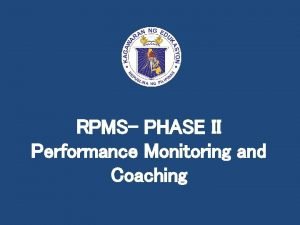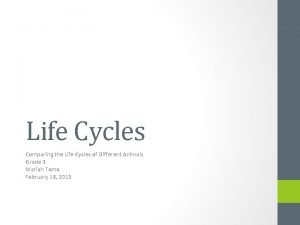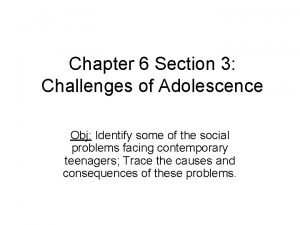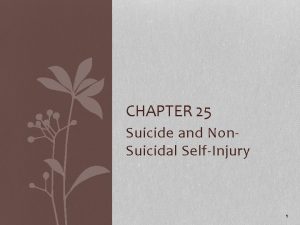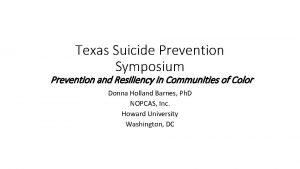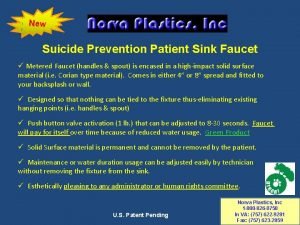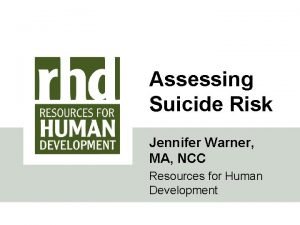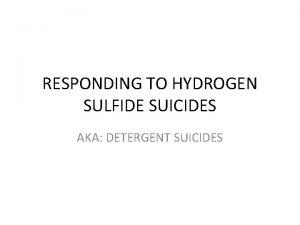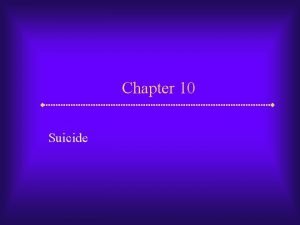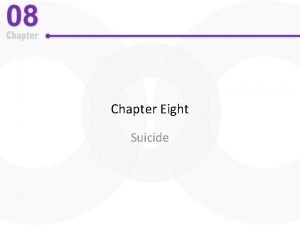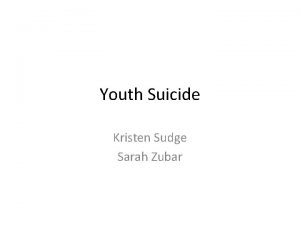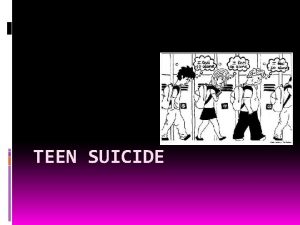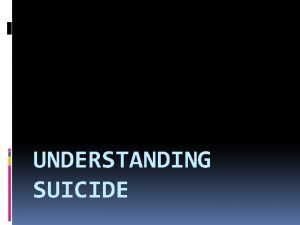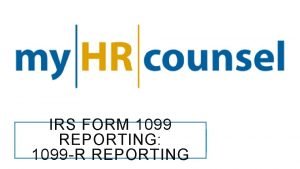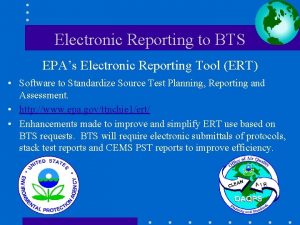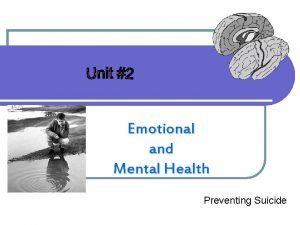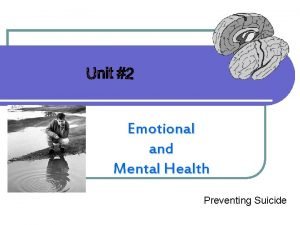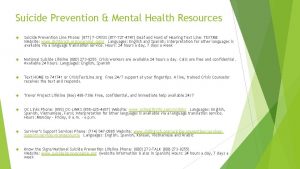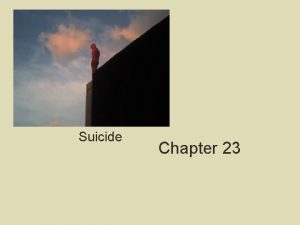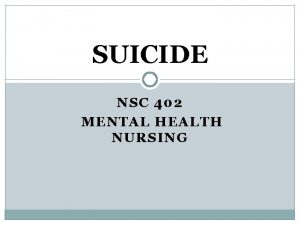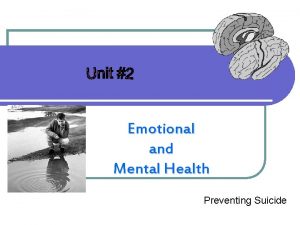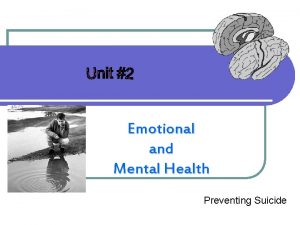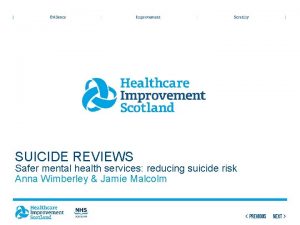RPMS Suicide Reporting Form in the Electronic Health




























- Slides: 28

RPMS Suicide Reporting Form in the Electronic Health Record V 1. 1 Patch 6 Indian Health Service Office of Information Technology

Objectives • • SRF Background and Purpose GPRA Performance Measure Access and Functionality Exporting and Reports

RPMS SRF Background • Supports Public Health Initiatives – DHHS National Strategy for Suicide Prevention – IHS Division of Behavioral Health Suicide Prevention Initiative – Director’s Health Initiatives: Behavioral Health – Clinical Quality Performance (GPRA measure) • Developed by – Office of Information Technology – I/T/U BH providers and subject matter experts • Business Owners – Division of Behavioral Health (DBH) – Suicide Prevention Committee (SPC)

GPRA Measure • The focus of the measure is the use of the form not the number of suicide events. Performance is measured by the number of forms in the aggregate national RPMS database. RPMS Suicide Reporting Forms Submitted by Year 2006 2007 2008 2009 2010 Target Baseline 1603 1758 1678 1700 1674 1598 (not met) 1687 On target Result 1603

Scope of the Problem • 8 th leading cause of death for AI/AN of all ages • 2 nd leading cause of death for AI/AN ages 10 – 34 • Rates for AI/AN ages 10 - 34 are almost twice as high as the national average • Source: CDC

Purpose of the SRF • Improve data collection • Inform suicide prevention activities – Standardized and systematic method for documenting incidents of suicide – Accurate suicide data at the point of care – Timely data – Capture specificity of location and associated risk factors

What data does the SRF capture? • Provider who completed the SRF • Patient demographics • Type of suicide incident – Ideation with intent and plan – Attempt – Completion – Combination Suicide/Homicide • Standard suicide epidemiological data – Method – Substances involved – Contributing factors

Paper-based Form • Data can be captured on paper form for entry into RPMS later by Data Entry staff.

Dependencies for Use and Exporting • RPMS Prerequisite – BHS v 4. 0 (namespace AMH) must be loaded in order to utilize the Suicide Reporting Form in any of the RPMS applications (EHR, PCC, BHS v 4. 0) • Database – SRF data resides in the AMH database not the PCC database – SRF data is exported to IHS Headquarters via the monthly BHS export • This is a separate export from the NDW (PCC) export

SRF Exports and Data • Export process – Exploring options to consolidate the AMH SRF export with the NDW export • Local SRF reports – Immediate access to SRF data • Inform prevention and intervention efforts • Data available for funding opportunities (MSPI) • Aggregate national data – GPRA measure – Web-based BH data mart • Provides access to aggregate data to DBH leadership and Area BH Consultants

Access • Access to SRF data entry and reports is restricted to providers (BH, Medical and Nursing) and data entry staff • EHR • Suicide Form component must be installed by EHR CAC • Location in EHR user interface will vary with different EHR user templates

Security Keys • PCC (for the Electronic Health Record & PCC ) – APCDZ SUICIDE FORMS – APCDZ SUICIDE FORM DELETE • Delete key should only be given to HIM Chief and BH Director – APCLZ SUICIDE REPORTS

SRF and the Medical Record • The form is often completed in the context of a visit but SRF data is not visit-related (i. e. does not populate the RPMS Visit file) • Data collection tool – not a clinical intervention tool – Services provided in response to a suicide event must be appropriately documented in the patient’s medical record

Standards for Entering SRF • Policies and procedures for completing a SRF are determined at the local level – For example, providers may be instructed to document historical events or only those that occurred within the past 72 hours – Consistency is essential to data integrity – National guidelines from SPC are pending

Other EHR Tools to Trigger SRF Documentation – Crisis note • TIU note title created by the provider with a CWADF icon visible when patient is in focus • Note templates can be tied to the title to remind providers to complete SRF documentation once progress note documentation has been completed – Scheduled notifications • EHR notification tab – Manual process to remind provider to complete a form

Local SRF Reports • Access – Controlled by security keys • Not all providers have access to RPMS Reports – SRF reports available in both PCC and BHS • PCC Reports • Not as robust as AMH SRF reports • Can run aggregate SRF data

Web-based BH Data Mart • Secure Web-based BH Data Mart (IHPES) • Data Source: AMH Export Database – Aggregate data only (no patient identifiers) – Not AI/AN prevalence data • Not all AI/ANs receive care at RPMS facilities • Not all sites export RPMS data regularly • SRF is underutilized • Access: Restricted – Division of Behavioral Health Senior Management – Area BH Directors/Consultants – Password protection, audit log, Terms of Use • Future enhancements – – More robust reports, ability to enter forms

EHRv 1. 1 Patch 6 Fixes • Performance issues addressed – EHR templates that include the Suicide Form now load as quickly as other EHR templates • SSN removed from form • Patient demographics moved to bottom of form • Type of Self-Destructive Act Field – Can now document all combinations of suicide with homicide (attempted and completed) – NOTE: Patch 6 includes two inactive codes • DO NOT select ASH or CSH

EHR v 1. 1 Patch 7 Planned Changes • All fields except Local Case Number and Narrative will be mandatory but not forced • Lethality field will be inactivated • Some field lengths will be updated to be consistent • Two inactive entries from the type of Self Destructive field will be removed from the drop down list – Attempted Suicide with Homicide (ASH) – Completed Suicide with Homicide (CSH)

Suicide Reporting Form Location Options Suicide Reporting Form on a tab

Suicide Reporting Form Location Options (continued) Suicide Reporting Form on a tree structured menu

Adding SRF to EHR Template • Right click where you want to add the Suicide Reporting form. This is usually on a tab in the Patient Chart. • Click ADD OBJECT

Adding SRF to EHR Template • Open NAME folder • Select Suicide Form and click ADD

Adding SRF to EHR Template • Double click to maximize the form to the tab

Adding SRF to EHR Template • Save template • Exit design mode

Contingency Plan for SRF • Patches are designed to improve package functionality however in rare occasions errors can occur and a site must plan for these instances • Each site should have a contingency plan in place to capture all patient encounters in case EHR or other application is not accessible – i. e. Outpatient departments will return to a PCC form or PCC+ form until system returns – Plan for the secure storage and disposition of paper forms once the information is entered into RPMS

Contingency Plan for SRF • SRF paper forms can be used as an alternative to direct-computer provider entry – These forms should be stored and readily accessible during down times – Download forms at: www. ihs. gov/cio/bh • If EHR is down consider provider documentation on paper form with Data Entry into PCC via PCC SF mnemonic • If RPMS is down consider provider documentation on paper forms for later entry into RPMS by Data Entry

EHR SRF Data Entry Demonstration
 Rpms phase 2 explanation
Rpms phase 2 explanation An electronic is the electronic exchange of money or scrip
An electronic is the electronic exchange of money or scrip Electronic field production examples
Electronic field production examples Suicide girls colombia
Suicide girls colombia Mad acronym suicide prevention
Mad acronym suicide prevention The citadel counseling center
The citadel counseling center Youth suicide research consortium
Youth suicide research consortium Bill nye the science guy life cycles
Bill nye the science guy life cycles Icd kecelakaan lalu lintas
Icd kecelakaan lalu lintas Chapter 5 glencoe health
Chapter 5 glencoe health Egoistic suicide
Egoistic suicide What are the challenges of adolescence
What are the challenges of adolescence The sad persons scale
The sad persons scale Why people die by suicide joiner
Why people die by suicide joiner Suicide prevention chain teach
Suicide prevention chain teach Texas suicide prevention symposium
Texas suicide prevention symposium Suicide prevention sink
Suicide prevention sink Loudoun county student suicide
Loudoun county student suicide Break up suicide
Break up suicide Suicide inhibitor
Suicide inhibitor Digestive enzymes and their functions table
Digestive enzymes and their functions table Dr. spock's son committed suicide
Dr. spock's son committed suicide Slap suicide assessment
Slap suicide assessment Shadetree army
Shadetree army Detergent suicides
Detergent suicides Dr. thomas jentges suicide
Dr. thomas jentges suicide Prévention du suicide
Prévention du suicide Detergent suicide how to make
Detergent suicide how to make Bonikhausen
Bonikhausen
